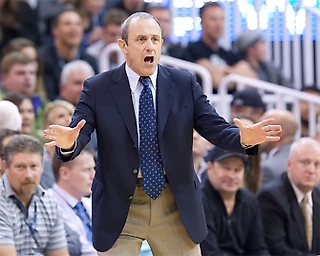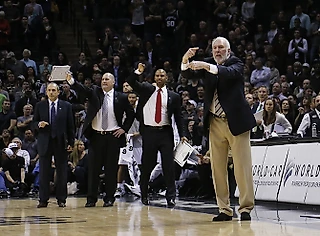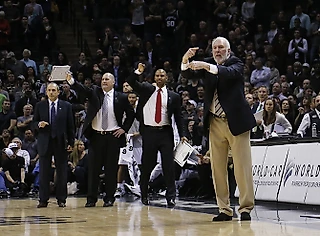Common over individual
Right after Real Madrid’s season ended, together with the club’s management we have reached an agreement that before we make any comments and assessments for the media, we’re going to sit down for a meeting to evaluate the season and discuss the club’s plans for the future. So, right now I have to ask all my readers who are interested in analysis on how Real Madrid fared this year to be patient. I’ll get to that point when the time is right.
Still, just to give you a short summary of how the ACB play-offs went for Real Madrid – we started it with a home loss to Cajasol but then claimed two following games and advanced to the next round. We were close to stealing one of the first couple of games in Vitoria, the one that went into overtime, but eventually found ourselves trailing 0-2 in the semifinal clash with Caja Laboral. We responded with two home victories to even the series. Those were definitely two of our best home games this season. Finally, the team found right balance and chemistry. Moreover, we got some great individual performances and that also helped a lot. Here first and foremost I’m talking about our captain Felipe Reyes who was playing injury-free for the last month and a half and had great impact on both play-off series.
So, for us, everything was set to be decided in one final game in Vitoria. Like it usually happens when so much is at stake, both teams were nervous and had real trouble scoring the ball. It all came down to the last 4-5 minutes. We were ahead at that point but unfortunately failed to sustain the effort down the stretch. Caja Laboral went on to face Barcelona in the Finals.
I had the opportunity to watch CSKA beat Khimki and become champions of Russia yet again. The Moscow club went through the play-offs undefeated, and at the decisive stage I think they had some extra motivation because they wanted to prove that some comments made by Khimki head coach were – let’s put it this way – not true. It’s funny that even despite Matjaz Smodis’ injury-plagued season and Viktor Khryapa’s absence in the third game, CSKA somehow managed to crush Khimki even more convincingly than they did last year, when the outcome was 3-1.
I think international referees did a good job in this series. Most importantly, they managed to calm down all the speculations that were both wrong and disrespectful to the coaches, players and management of CSKA who’ve been doing their best to keep the club at the top level over the years.
Anyway, the season for CSKA has ended on a very high note, and it’s an incredible accomplishment. From now on it’ll be interesting to see how things develop in Russia, especially if you decide to move in a new direction. Personally, I’d refrain from giving advice to Russian executives on what to do and how to run their league. They have plenty of experience and enough knowledge to make such decisions.
Still, two observations come to my mind. The first one is the necessity to pursue common goals, common achievement and get common idea on how to develop basketball in Russia. That’s extremely important and has to be done in order not to let individual goals overwhelm common ones. The common goal currently is to draw more attention to the League, to have a better organization, improve refereeing and increase the number of fans in the stands. It all can be done if there’s a strong sense of mutual commitment, if individual goals are not the first option. Here’s an example from the Italian League. In the eighties, executives who were in charge there strived to reach the common goal. And now, 20 years later, the League is split; it’s essentially a group of individuals who only care about their clubs’ goals. While not entirely wrong, such approach sometimes hinders the development of the League and basketball in general.
The second observation I’d like to make – and it’s something I came up with during my first year in Russia – is that your country can not allow itself the luxury of wasting raw basketball talent it possesses. My first advice to the League and the Federation is to create a permanent coaching staff. Its members would travel all around the country, identify the best talent with pro potential and then make sure those young players spend some period of time working together every year. The talented youngsters also need to play international games, maybe even go to the United States to test their skills versus the best American schools. That’s the right way to go if you want to develop talented players and avoid losing them along the way. Sure, the coach of the National team can work on part-time basis, just like coach Blatt is doing now, but you have to install a permanent coaching staff that will be responsible for all U22 and younger players. As for now, the whole recruiting process in Russia is based solely on the effort of some executives who do it pursuing their own individual goals. This has to change.
At the same time, I believe major effort should be produced to aid coaches’ development. And it also can be done with the help of the permanent coaching stuff I mentioned above. Just imagine – if, let’s say, three of the best and most celebrated coaches of Russia worked together full-time for the Federation recruiting young and talented players, guiding all the teams that participate in European championships and running seminars and clinics for their younger and less experienced colleagues, in the next 4 or 5 years Russian basketball could make a giant leap forward as compared to where it’s now. Similar system is in place in most European countries, with Spain being the monumental example. In Sergio Scariolo they have an excellent part-time head coach working with the National team. And at the same time Spaniards have established a very strong permanent structure that identifies and follows the progress of all talented kids starting from the age of twelve and then all the way until they are twenty. Italy has it the same way. Greece has it as well.
Going back to the topic of European basketball, it will be interesting to see what changes will happen at the major clubs this summer. For now we know that Zelimir Obradovic is staying put as he’s prolonged his contract with Panathinaikos. After coach Tanjevic stepped down for health reasons, Neven Spahija replaced him at the helm of Fenerbahce Ulker. Here I’d like to wish all the best and good luck to both of them.
As for CSKA, I think a lot will depend on Andrey Vatutin’s decision to stay at the club or to move on and seek new challenges elsewhere. I believe his choice will depend on the type of budget CSKA will have next season. If we find out that Andrey is staying, we could take it as a strong indication that the club has sufficient financial guarantees for the future. Anyway, it will be very interesting to follow the situation at CSKA because, as Andrey has already mentioned in a recent interview, recruiting and signing new players will be pivotal for the club’s success next season. The fantastic group of veterans who play major roles for CSKA at the moment need to be surrounded by a strong “supporting cast”, and I’m using this term with absolutely no disrespect. Adding quality role players over the summer could prove a key factor for extending CSKA’s fantastic streak that already includes eight consecutive Final Fours.









